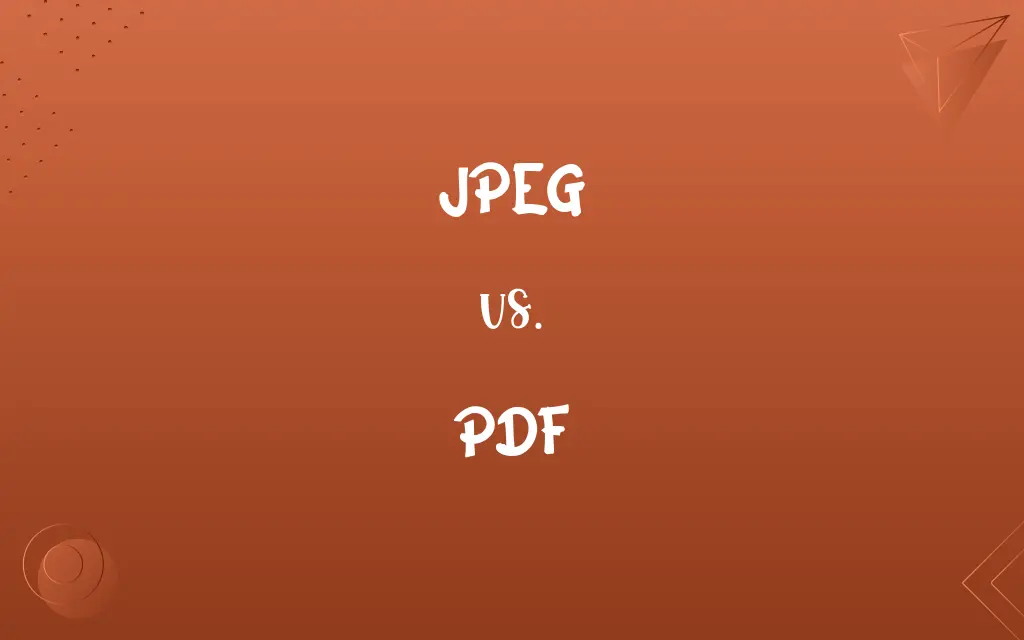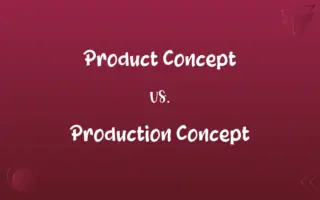JPEG vs. PDF: Know the Difference

By Shumaila Saeed || Published on February 6, 2024
JPEG is a lossy image format for digital photos, while PDF is a versatile file format for documents preserving layout, text, and images.

Key Differences
JPEG is primarily used for digital photography and web images, offering good quality with small file sizes. PDF is designed for documents, maintaining the same layout regardless of device or software.
Shumaila Saeed
Feb 06, 2024
JPEG uses lossy compression, which reduces file size but can decrease image quality. PDFs can contain text, images, and vectors, and retain high quality even with compression.
Shumaila Saeed
Feb 06, 2024
JPEG files are universally compatible with image viewers and web browsers. PDF files require a specific reader, like Adobe Acrobat, but are also widely accessible.
Shumaila Saeed
Feb 06, 2024
JPEG is unsuitable for text-heavy documents due to quality loss in compression. PDF is ideal for documents, forms, and e-books, maintaining clarity for text and images.
Shumaila Saeed
Feb 06, 2024
Editing JPEG images is straightforward with most image editing software. Editing PDFs often requires specialized software or tools for altering text and layout.
Shumaila Saeed
Feb 06, 2024
ADVERTISEMENT
Comparison Chart
Primary Use
Digital photography and web images
Document storage and presentation
Shumaila Saeed
Feb 06, 2024
Compression Type
Lossy, which can reduce quality
Can be lossless, retaining quality
Shumaila Saeed
Feb 06, 2024
Universality
Widely supported in image software
Requires PDF reader, but broadly used
Shumaila Saeed
Feb 06, 2024
ADVERTISEMENT
JPEG and PDF Definitions
Can contain various elements;
The PDF included text, images, and graphs.
Shumaila Saeed
Jan 19, 2024
JPEG
Uses lossy compression;
The JPEG file was smaller but had some quality loss.
Shumaila Saeed
Jan 19, 2024
A file format for documents;
I sent the report as a PDF to preserve the layout.
Shumaila Saeed
Jan 19, 2024
JPEG
Common for web use;
Websites often use JPEG images for quicker loading.
Shumaila Saeed
Jan 19, 2024
ADVERTISEMENT
JPEG
Not ideal for text;
Saving the document as a JPEG made the text blurry.
Shumaila Saeed
Jan 19, 2024
JPEG
Standard for digital cameras;
My camera captures images in JPEG format.
Shumaila Saeed
Jan 19, 2024
JPEG
A standardized format for storing graphic data in binary computer files, allowing over 16 million different colors. It allows for lossy compression, i. e. the compression of data into a form which re-expands into an image close, but not identical to the original image. Files stored in this format usually carry the extension jpg or jpeg. Compare GIF.
Shumaila Saeed
Jan 17, 2024
Repeatedly Asked Queries
Is PDF good for document sharing?
Yes, it maintains the same layout across platforms.
Shumaila Saeed
Feb 06, 2024
Is JPEG good for printing photos?
Yes, but with high resolution for quality.
Shumaila Saeed
Feb 06, 2024
Do JPEGs lose quality?
Yes, JPEG uses lossy compression which can reduce quality.
Shumaila Saeed
Feb 06, 2024
Are PDF files larger than JPEGs?
Generally, yes, especially with multiple elements.
Shumaila Saeed
Feb 06, 2024
Do JPEGs support transparency?
No, JPEGs do not support transparent backgrounds.
Shumaila Saeed
Feb 06, 2024
Is PDF a good choice for presentations?
Yes, due to its layout consistency.
Shumaila Saeed
Feb 06, 2024
Are PDFs good for archiving?
Yes, they're excellent for long-term document storage.
Shumaila Saeed
Feb 06, 2024
Are PDFs universally viewable?
Yes, with a PDF reader, they are widely accessible.
Shumaila Saeed
Feb 06, 2024
Should I use JPEG for text documents?
No, JPEG is not ideal for text clarity.
Shumaila Saeed
Feb 06, 2024
Can PDFs be interactive?
Yes, they can include interactive elements like forms.
Shumaila Saeed
Feb 06, 2024
Can JPEG handle high-quality images?
Yes, but with potential quality loss on compression.
Shumaila Saeed
Feb 06, 2024
Share this page
Link for your blog / website
HTML
Link to share via messenger
About Author
Written by
Shumaila SaeedShumaila Saeed, an expert content creator with 6 years of experience, specializes in distilling complex topics into easily digestible comparisons, shining a light on the nuances that both inform and educate readers with clarity and accuracy.









































































